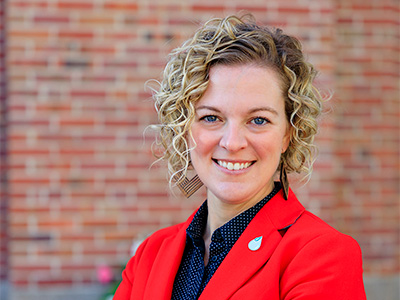Lincoln, Nebraska, U.S.A. — “Anyone working in irrigation has the power to help move the needle on nutrition,” said Claudia Ringer, Ph.D., director of natural resources and resilience at the International Food Policy Research Institute. Her keynote address offered a compelling exploration of the often-overlooked connection between irrigation and nutrition.
Ringler was one of over 100 expert speakers participating in the week-long 2025 Water for Food Global Conference held in Lincoln, Neb. April 28 to May 2, 2025.
More than 350 attendees from 23 different countries came together to tackle the critical challenge of ensuring a resilient future with water and food security for all. Hosted by the Daugherty Water for Food Global Institute at the University of Nebraska, the conference focused on sharing innovative solutions, research, and technologies and addressed the challenge of producing sufficient food while preserving vital water resources. Participants included a diverse range of stakeholders, spanning academia, government agencies, policymaking groups, entrepreneurs, water managers, growers, students, non-profits, non-governmental organizations, and the private sector.
"The conference provided a crucial platform to collaborate and share knowledge on sustainable water management and agricultural practices," said Peter G. McCornick, Ph.D., executive director of the Daugherty Water for Food Global Institute. "The insights and connections forged here will be instrumental in developing effective strategies and continuing our collective work to ensure a food-secure future for generations to come."
- Key highlights of the conference included sessions on:
- Cutting-edge research to improve water use efficiency in agriculture
- Case studies showcasing successful implementation of sustainable farming practices
- Supporting, financing and scaling smallholder irrigation
- Drought, water and human health
- Training the next generation of food and water experts
- Framing the conversation surrounding water and food at future, high-level international meetings
- Policy frameworks to promote responsible water management
The conference emphasized the importance of collaboration among various sectors to achieve sustainable solutions. Attendees explored strategies for enhancing agricultural productivity, promoting resilient farming, and safeguarding water resources.
“I loved the variety of viewpoints provided. Farmers, policymakers, and scientists all at the same table. Also, the international perspective was very valuable,” said one attendee.
The 2025 Water for Food Global Conference reinforced the urgency of addressing the interconnected challenges of water and food security. The outcomes of the conference are expected to contribute to the development of actionable solutions and partnerships to achieve a more resilient and sustainable future.
The conference featured speakers from global partnering organizations and companies including the Nature Conservancy, the International Water Management Institute, Catholic Relief Services, Bayer CropScience, the Food and Agriculture Organization of the United Nations (FAO), the International Food Policy Research Institute, LI-COR, the United Nations Convention to Combat Desertification (UNCCD), Scoular, the National Drought Mitigation Center, the African Union Commission, and others.
The conference also showcased Nebraska outside of the conference room to the global audience by hosting field tours of local farms, Nebraska Natural Resources Districts, and research facilities, with the help of Nebraska commodity boards. The tours were an opportunity to share Nebraska’s unique water management system and agricultural ecosystem.
All conference sessions were recorded and will be available to view on the institute’s YouTube Channel in the coming months. More information can be found on the conference website.
###
About the Daugherty Water for Food Global Institute
The Daugherty Water for Food Global Institute at the University of Nebraska was founded in 2010 to address the global challenge of achieving food security with less stress on water resources by conducting scientific and policy research, using the results to inform and advise policymakers, and educating future water for food leaders. Learn more at waterforfood.nebraska.edu.


